MLB fans can handle the truth, cooling contenders, and 7 more observations
Starting Lineup is a bi-weekly collection of reporting, observations, and insights from the Major League Baseball beat.
Leading off …
Baltimore ownership's decision to suspend Orioles' play-by-play voice Kevin Brown for citing a fact - a very publicly available fact - during a late July broadcast outraged many fans and many in the media industry.
Brown was suspended for noting the Orioles' poor record at Tropicana Field in recent seasons during a pregame introduction in late July.
Here's the clip of Kevin Brown's pregame comments on the Orioles' recent record against the Rays ahead of a series finale on July 23. Sources tell AA these comments led to Brown's current indefinite suspension from Orioles' broadcasts. pic.twitter.com/csURU04fJU
— Awful Announcing (@awfulannouncing) August 7, 2023
After the report became public, "Free Kevin Brown!" chants broke out Wednesday night at Camden Yards. Brown is set to return to the broadcast booth Friday following public backlash regarding the decision.
While this might seem like an isolated case - or at least isolated to the Angelos family, which has a history of discarding talented broadcasters - what's concerning is where the handling of the message is headed in pro sports, and who is managing it.
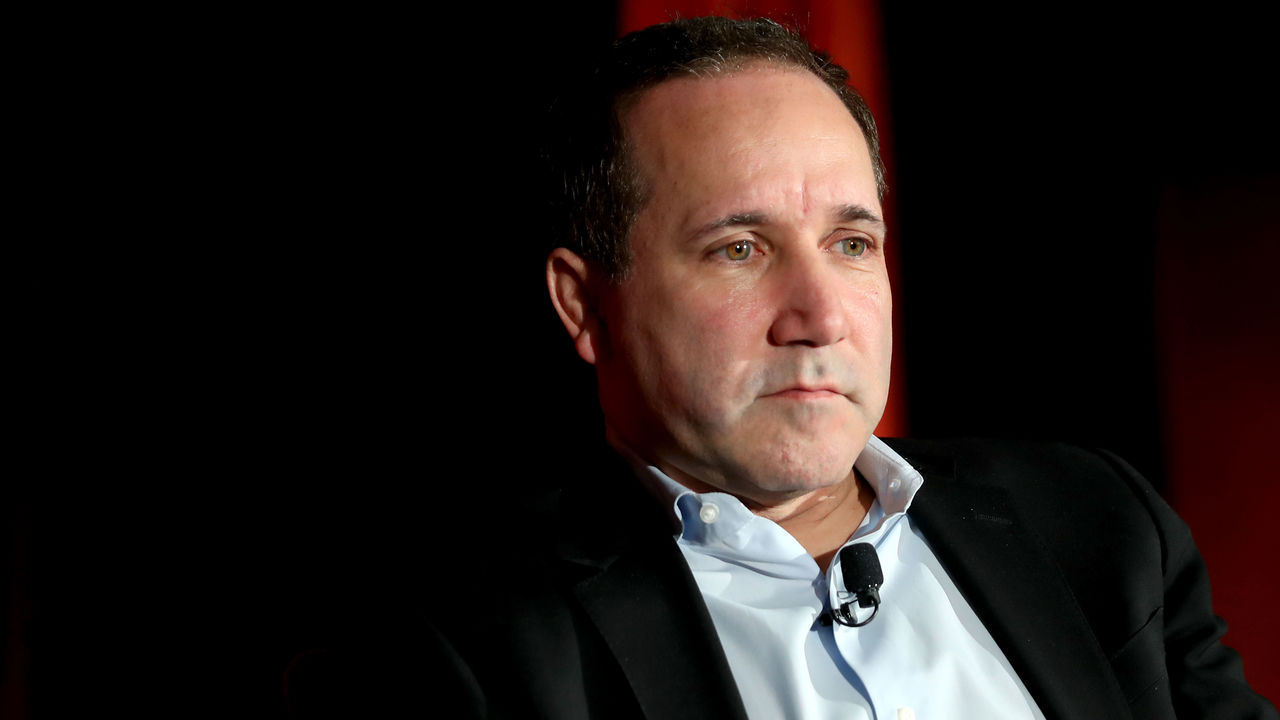
North American pro sports leagues and their teams have taken over more and more control over their own content and messaging.
Teams have long employed broadcasters, but now they and the leagues have their own websites, television networks, and soon more direct-to-consumer streaming broadcasts.
They increasingly have more control over the narrative and news, exacerbated by the weakening of traditional media outlets in the broad disruption of the industry. The newspaper of record in the city, The Baltimore Sun, has endured a number of layoffs this century. The Athletic laid off its Orioles beat writer earlier this year and no longer covers the team on a daily basis.
The trend is hardly isolated to Baltimore.
From 2008-21, newsrooms across the United States reduced their editorial staff by 28%, according to Pew Research. Cuts hit record levels this year.
Meanwhile, public relations jobs, those roles concerned with managing the public message, are increasing. According to a Bloomberg analysis of 2018 census data, there were 6.4 public relations professionals for every news reporter, a dramatic increase from 1.9 PR professionals for every reporter in 1998. The same trends apply in Canada.
More and more, the sources of media in pro sports are controlled by the owners of businesses making the news.
So that brings us back to Brown's suspension. When something as straightforward as a team's record against another can't be reported without suspension, where are broadcasts headed?
What does the future of team-produced messaging look like? How tightly will it be controlled? Will score bugs be permitted on broadcasts when the team is trailing?
Yes, ownership's intervention was over the top in this case. Hopefully, it remains an isolated one.
As Evan Stockton, an announcer for Triple-A Syracuse, noted: "Fans aren't stupid."
But teams and leagues intervene in more subtle ways, too.
One isn't going to find unpleasant headlines on MLB.com.
Here's more, from SNY's television director of Mets broadcasts:
It's shocking how much other broadcasts have to color within the lines mandated by management.
— John DeMarsico (@JohnDeMarsico) August 8, 2023
During the pandemic, when we relied on home teams to provide us a "world" feed, I was once informed that a particular team wasn't allowed to show their manager in the dugout. Insane. https://t.co/vdQAknb3H5
The Mets' booth crew - Gary Cohen, Ron Darling, and Keith Hernandez - enjoys much latitude to be themselves, telling it like it is, and perhaps in large part because of that, the broadcast team is generally regarded as one of the game's best.
"We work for an organization that has always allowed its announcers to tell the truth," Cohen told Tim Britton of The Athletic in June 2019. "That doesn't mean you engage in character assassination, and that doesn't mean you fly off the handle.
"I don't understand why every organization doesn't feel this way. Many believe that in not telling the truth that you're doing a service to the organization, and the fact of the matter is it's just not true. Because if everything is great and everything is sunshine, then when things really are, there's no differentiation. Part of being a baseball fan is experiencing the highs and lows as they happen, and understanding them for what they are."
Baseball fans can handle the truth.
No. 2: Bring back No. 163
With the Mariners within range of the Blue Jays for the final AL wild-card spot, tiebreakers become something to consider.
The two clubs split their regular-season series. The second tiebreaker is intradivision record. The Jays will lose that one.
It's bizarre that a wild-card tie between two teams in different divisions is decided by play within their own division (and only one division includes the A's). There are better ways, including the old one: game No. 163.
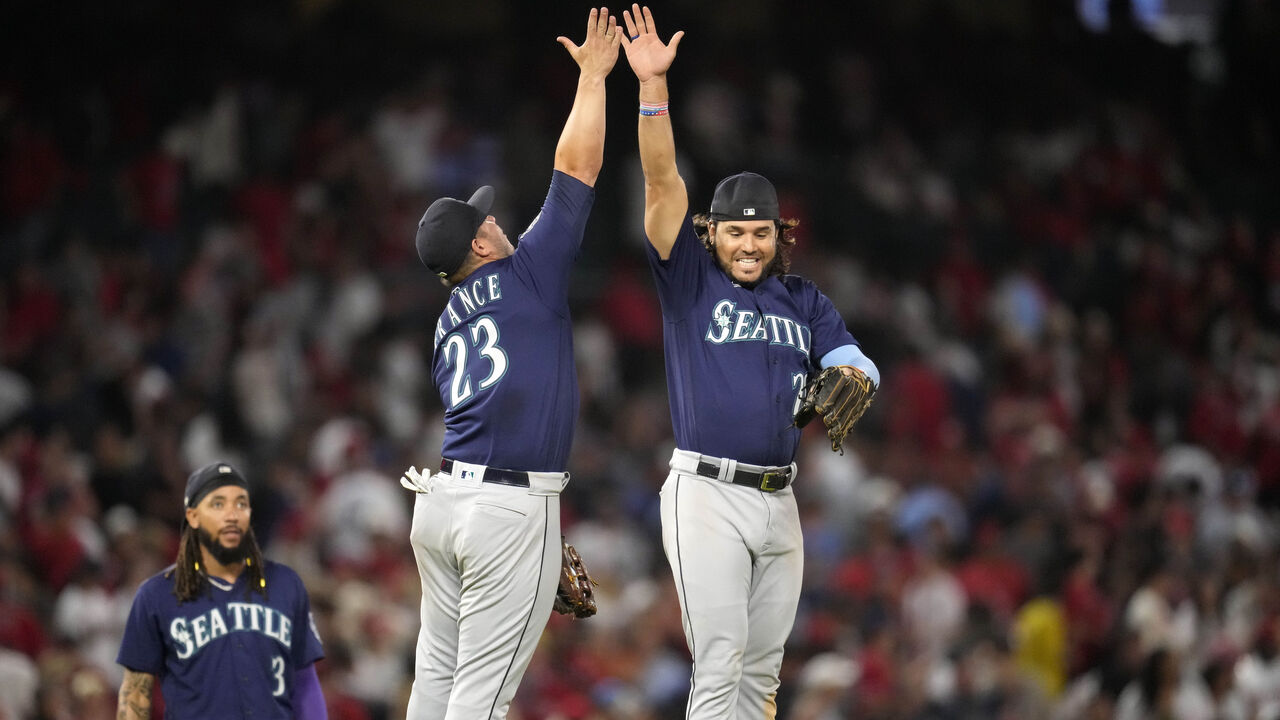
No. 3: Why, again, did Angels buy at deadline?
Exhibit A of the importance of honest trade deadline self-evaluation: the Angels.
The club held only 19.5% playoff chances entering deadline day (Aug. 1). Entering play Friday, that number is down to 2.3%. Their prized acquisition, pitcher Lucas Giolito, has struggled. In the final accounting of the season, they'll likely miss the playoffs, and Shohei Ohtani, Giolito, and Hunter Renfroe will be headed to free agency. Their already-poor farm system was further gutted at the deadline by the acquisitions, and if Ohtani leaves for another team, their very lengthy rebuild will get even longer.
No. 4: Cooling clubs in the dog days
Hopeful contenders like the Diamondbacks (5-19), Marlins (7-17), and Reds (10-16) had the most losses over the last month entering play Thursday, and they've all seen their playoff chances take a hit. The Guardians are next with 15 losses. The Diamondbacks, Guardians, and Reds are three of the younger teams in baseball. The Rays are the third-youngest team and have also struggled since their torrid start.
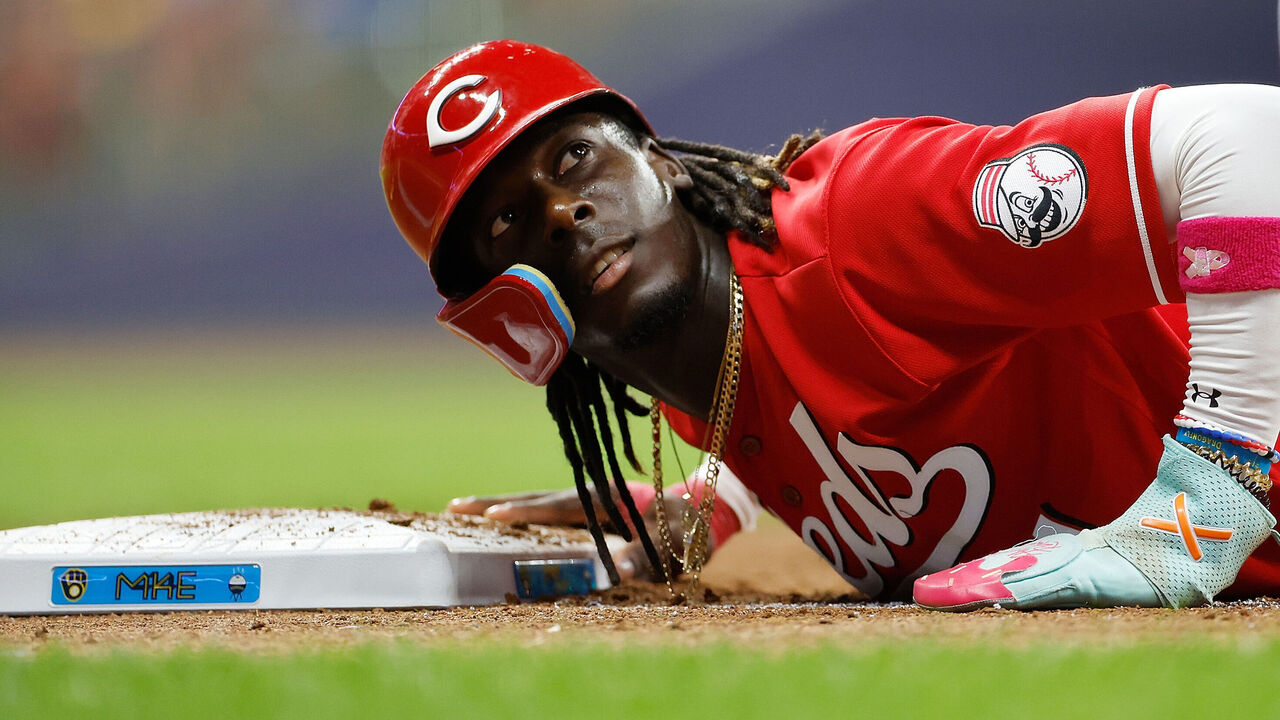
Former major-league outfielder Travis Snider recently shared his thoughts on the dog days of August. The challenge can feel overwhelming, he claims.
"It’s the fifth month straight of playing almost every single day," he wrote. "Physically, the aches and pains are real and likely to remain until the offseason. Mentally, you still can’t quite see the finish line, as there are still almost 50 games left in the season."
The Cubs have gained 40 percentage points in their playoff probability over the last month, and now find themselves squarely in the mix, led by a resurgent Cody Bellinger, a comeback player of the year candidate. The Cubs are in the middle of the pack in age. It's just one season, and just one data point, but perhaps there's something to learn how to handle the grind.
No. 5: Ace-less baseball
There were 19 qualified pitchers with sub-3.00 ERAs last season. This year: four. Regular dominant pitching performances have been rare in this new baseball environment. Baseball wanted more runs, and it got 'em.
No. 6: One area where the Rays don't excel
After a historic start to the season achieved against the softest early schedule in baseball, the Rays have come crashing back down to earth and now trail the Orioles in the AL East. It hasn't helped that they've lost a number of high-quality arms, like Jeffrey Springs and Drew Rasmussen, and now staff ace Shane McClanahan is out for the year with an elbow injury.
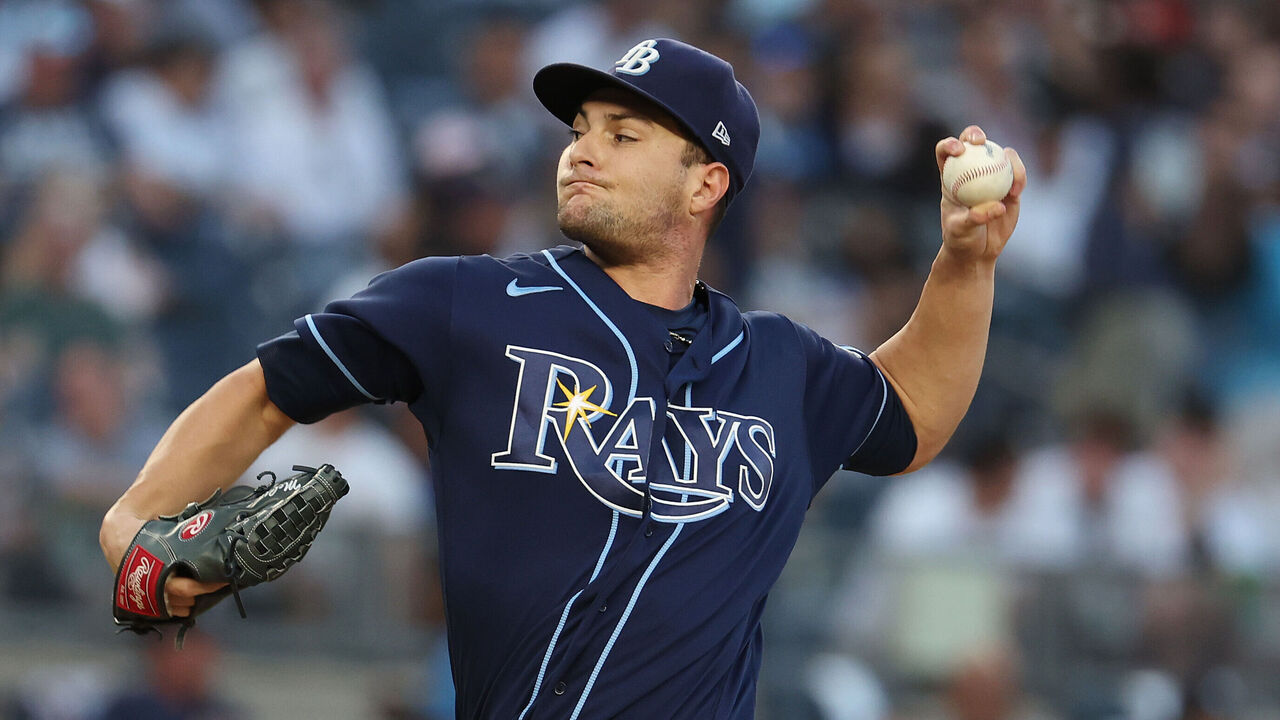
While Springs and Rasmussen arrived in Tampa with prior injury histories, McClanahan is homegrown. Keeping pitchers healthy remains baseball's grail quest. Even the Rays can't crack this code.
No. 7: Young stars, different directions
Blue Jays rookie sensation Davis Schneider owns more WAR (0.6) in six games than Vladimir Guerrero Jr. (0.5) in 113 this season.
While WAR isn't a perfect measure, it does speak to something of a disappointing and head-scratching season for Guerrero.
His underlying stats (93.6 mph average exit velocity, 116.7 max velocity, 12.6% barrel rate) aren't so different from his MVP-level 2021 season (95.1 average exit velocity, 117.4 max, 15.1% barrel rate), but his slash line this year (.267/.342/.445) is much different from 2021 (.311/.401/.601).
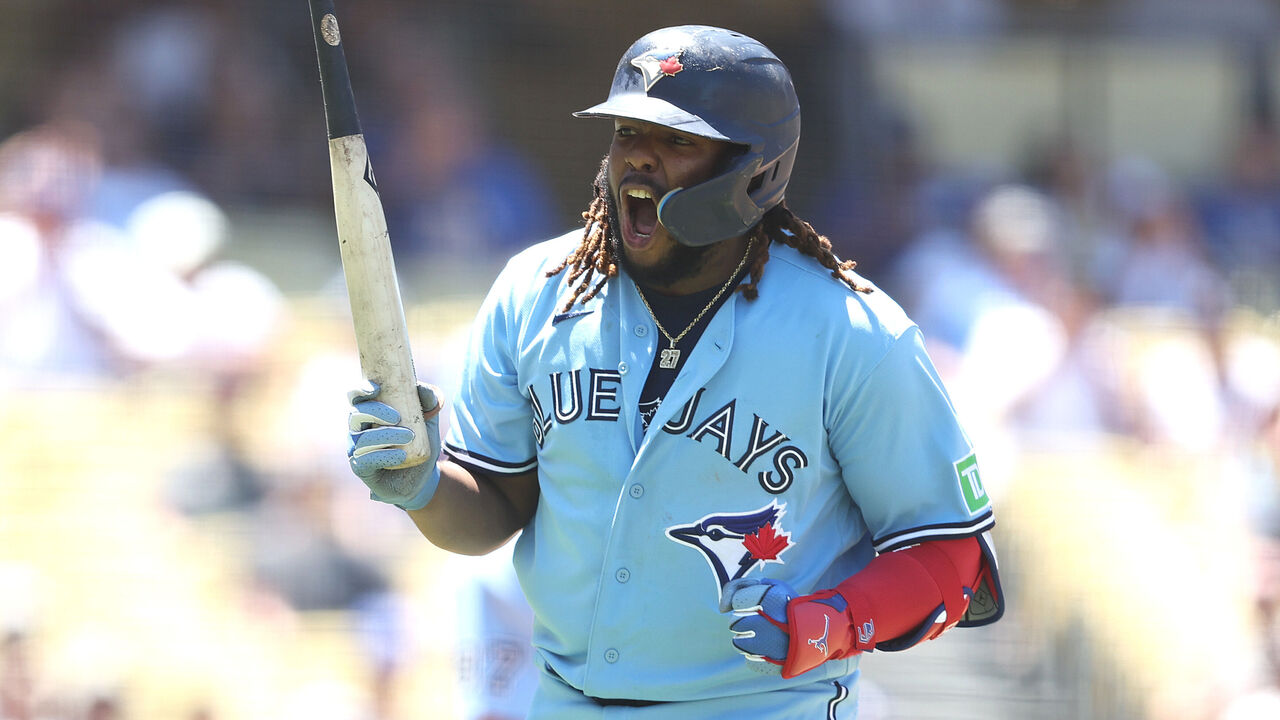
While he's still an above-average hitter (118 wRC+), it's his second year of decline at an age when he should - ideally - be maintaining performance or improving. He's only been elite once in his career despite being a prospect some evaluators gave top-of-the-scale 80 grades to his hit and power tools.
While he's only 24, and while even elite talents like Bryce Harper went through lulls like this, Guerrero's also only two-plus years from free agency. The prospect of extending him might be becoming less expensive but also more complicated for Toronto.
Another young star is headed in a different direction.
After struggling to get on base in his first year and a half in the majors, Royals shortstop Bobby Witt Jr. may be figuring it out.
Witt is slashing .328/.366/.619 since July 1, and he now ranks 14th among position players in FanGraphs WAR (4.0) on the season.
How he got his hands in to square this 102 mph fastball from Jhoan Duran late last month was remarkable:
Bobby Witt Jr., insane hands
— David Adler (@_dadler) July 29, 2023
Walk-off grand slam off a 101.8 mph inside fastball from Jhoan Duran
T-5th-fastest pitch hit for a HR in the pitch-tracking era (since 2008)
No one has homered off a pitch that fast that was out of the strike zone -- let alone *inside* pic.twitter.com/V6eTQgPiH3
No. 8: It's ugly on the South Side
The White Sox opted for only a partial sell-off at the deadline, but the club may need a full-on retooling period this offseason, and not simply because of talent voids.
This team has clubhouse issues. The latest was a report of a physical altercation between Tim Anderson and Yasmani Grandal in the clubhouse regarding the final game before the All-Star break. According to executive producer Shane Riordan of 670AM in Chicago, Anderson was upset that Grandal wanted to leave a day early prior to the break because he wasn't in the lineup. Anderson confronted Grandal, and Grandal slapped him. Grandal later denied the report.
It's been an ugly season - and that was before Saturday's on-field brawl in Cleveland, where Anderson took a Jose Ramirez punch to the jaw.
Perhaps not as ugly as 2016, but ugly nonetheless.
The 2016 team had the Adam Eaton-Todd Frazier fight. Adam LaRoche retired in March over a workplace dispute about the presence of his son. Chris Sale was suspended in July "for insubordination and destroying team equipment." This might be ugly -- it isn't that. #WhiteSox https://t.co/uZVxaqCYcm
— DanHayesMLB (@DanHayesMLB) August 7, 2023
No. 9: Communication breakdown
One of the inefficiencies remaining in today's data-deluged game is player usage.
Take, for example, the curious case of Amed Rosario.
Despite an on-base percentage hovering around .300 and some of the poorest-rated defense at shortstop this season, Rosario was nearly an everyday fixture at short and Cleveland's No. 2 hitter under manager Terry Francona. In Cleveland this season, he played in 88 games, all starts at shortstop.
Following his trade to the Dodgers, Rosario is starting (generally) only against left-handed pitching, which he performs much better against, and is moving around the field. He's shown the ability to make plays at second base.
He's appeared in nine games at second base (five starts) and five games at shortstop (three starts) for L.A.
The Guardians and Dodgers are both renowned as being data-driven, forward-thinking organizations, but this trade is perhaps an example of some teams getting the most out of their lineup compared to others.
Stat of the week: 110
The Braves are the only team in baseball who had four players play in each of their first 110 games, and that hasn't happened since 1944. Baseball's best team has no time for load management.
Ronald Acuna Jr., Ozzie Albies, Matt Olson and Austin Riley have all played in each of the @Braves' first 110 games this season. The last time an MLB team had four players play in every one of their team's first 110 games of a season was the 1944 Cincinnati Reds. pic.twitter.com/mu36FlzhOp
— OptaSTATS (@OptaSTATS) August 8, 2023
He said it
"Down goes Anderson! Down goes Anderson!"
- Guardians radio play-by-play voice Tom Hamilton
You've seen and heard about Ramirez's right hook. I want to focus on Hamilton's call, which was remarkable in that he was able to cleanly and accurately describe Saturday's brawl while authoring an empathic and memorable call - channeling Howard Cosell's iconic "Down goes Frazier!" And it happened in the middle of an August game for a middling club he's followed since the spring.
After the call, Hamilton recalled some advice the late Herb Score gave him years ago:
"This is a bad team, but that can't have any impact on the broadcast," Score told him. "The record of the ball club can never impact how you prepare for a game or how you broadcast that game. There are too many people depending on you to hear that game and it might be the highlight of their day. You owe them your very best."
You never know what you'll see at the ballpark, Hamilton said, so you have to be prepared.
You don't see that every day
Speaking of weird stuff happening at Progressive Field, Blue Jays second baseman Cavan Biggio turned an unassisted double play - at first base - to get Toronto out of a jam Monday. It's an unusual play:
And now Cavan Biggio records an unassisted double play to end the inning!
— FOX Sports: MLB (@MLBONFOX) August 8, 2023
(via @BlueJays)pic.twitter.com/7Q6bcT2wxK
Chris Bassitt recognized its rarity.
There has to be more perfect games than 4 unassisted double plays where the 2nd baseman gets the 2nd out at first correct? I can’t get Biggio’s play out of my head.
— Chris Bassitt (@C_Bass419) August 8, 2023
In fact, Blue Jays PR dug up that it was the third such play since 1988, while there have been 12 perfect games since 1989.
It's a play that requires a very specific situation on the field, in regard to the score and batted-ball location, as Bassitt noted in the clubhouse Thursday. Don't hold your breath for the next one.
Travis Sawchik is theScore's senior baseball writer.